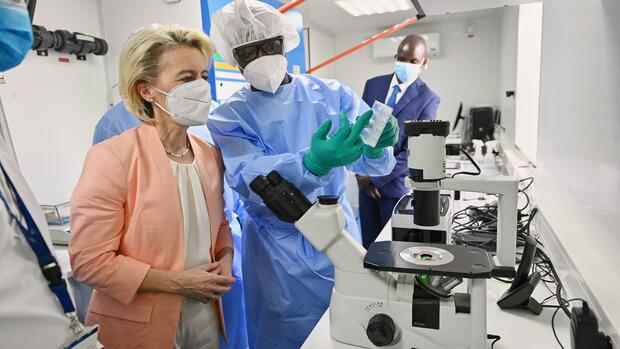EU Commission President with geopolitical claims.
(Photo: dpa)
Brussels The preparations for Europe’s response to China’s Silk Road initiative have been going on for years, and now the starting signal is finally to be given: At its summit meeting with the African Union on Thursday and Friday in Brussels, the EU wants to present an investment package worth 150 billion euros. Strategic goal: to curb the growing Chinese influence in Africa.
“Many former partners in these Chinese infrastructure projects are realizing what it means when you suddenly have long-term debt and your own population hardly benefits from such projects,” said EU Commission President Ursula von der Leyen to the Handelsblatt. “They are therefore approaching Europe and looking for a fairer deal.”
Von der Leyen has christened Europe’s counter-offensive “Global Gateway”. It has promised a “geopolitical commission” – and wants to keep this promise with a strategic infrastructure policy.
At the end of last year, the Commission announced that it would mobilize a total of 300 billion euros for Global Gateway. The money is said to come from various sources – the EU’s development budget, member states, the European Investment Bank and the private sector.
Top jobs of the day
Find the best jobs now and
be notified by email.
At the Africa summit, the EU wants to name projects that it wants to support with the program. The German economy has high expectations. She hopes for lucrative orders. “We need concrete infrastructure projects that show a real alternative to the Chinese ‘Belt and Road’ initiative,” says Ulrich Ackermann, head of the foreign trade department at the mechanical engineering association VDMA.
“Belt and Road” is the official title of China’s Silk Road Initiative. The European “projects should be implemented in close cooperation with European industry,” emphasizes Ackermann.
Europe’s industry expects lucrative orders
In recent years, European companies have recognized that they do not get a fair chance with Chinese infrastructure projects. “China’s state-owned construction companies have marginalized their European competitors in the African infrastructure market,” writes the European foreign construction association EIC in a position paper. The industry is now all the more hoping for participation.
However, no strategic focus has been identified so far. Instead of concentrating on major infrastructure projects such as the construction of roads, train connections or data cables, as the Chinese have successfully demonstrated, the EU initiative seems to amount to a hodgepodge of different projects.
The investment package for Africa combines previously unspecified projects for climate protection with initiatives for species protection; it promises to strengthen health systems and fund education programs. The most tangible plan is to set up a European satellite network that could also supply Africa with the Internet from space.
“The EU would do well to focus on Africa, as Chinese influence on the continent has been growing for many years,” said Noah Barkin, an expert on Sino-EU relations at the German Marshall Fund. But “sounding promises” alone achieved little.
Among the EU countries, Germany is one of the biggest supporters of a strategic infrastructure policy. What exactly is to be understood by this does not seem to be entirely clear even to the new federal government.
Federal government wants to identify “lighthouse projects”.
The opportunity would be good to seize the initiative: Germany has taken over the presidency of the industrial states’ club G7. In a strategy paper that it shared with the G7 partners and that is available to the Handelsblatt, the federal government announces “an ambitious agenda”. Within the framework of the G7, “lighthouse projects” are to be identified “with a special focus on health and climate”.
Such documents have repeatedly been circulating in the European capitals in recent months. What has been lacking so far is substance, more precisely: ideas for a rapid implementation of the ambitious goals. So far, Europe has only offered declarations of intent to China’s Silk Road.
More: China’s growth is weakening: the engine of the global economy is threatening to falter
